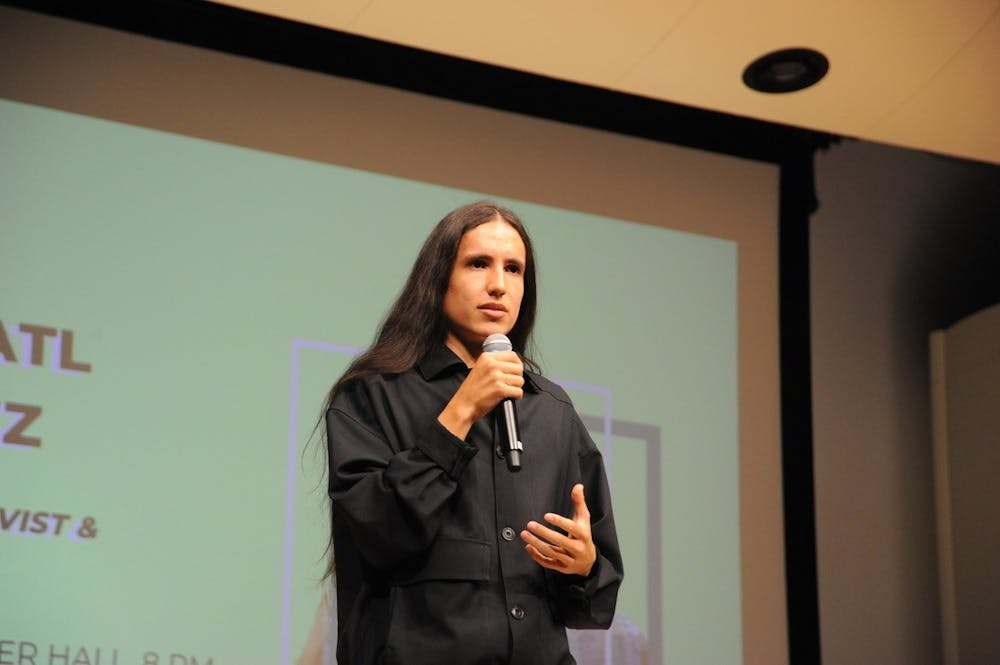The Foreign Affairs Symposium (FAS) hosted a talk with indigenous climate activist and hip-hop artist Xiuhtezcatl Martinez on Wednesday. The event was the second part of FAS’s “Anthem” lineup, which aims to bring in activists that capture the diversity of social movements advancing justice and equity around the world.
Martinez highlighted how his indigenous heritage has shaped his activism and connection to the environment.
“There was this teaching that there’s an inseparable connection that humanity has to the natural world,“ he said. “Within many indigenous communities... defending our land, defending our water, defending our culture, our people, our community... were all responses from a place of cultural survival.”
Martinez began protesting when he was five years old, following in the tradition of his older relatives, expressing that he was able to enact real change even while protesting on a local level.
“The fight that needed to be done within our community wasn’t just about changing these small local issues, it was about changing the minds and the hearts of the people who for a long time had felt very disconnected,“ Martinez said.
In the beginning of his career as an activist, Martinez noticed that many of the environmental groups he met with were largely comprised of older white people.
“I learned very quickly that the spaces we were organizing in didn’t actually reflect the communities that were being impacted by the climate crisis,” he said. “I was oftentimes the only young, brown person there. I asked myself and I asked my parents, ‘What’s going on?’”
This line of questioning caused Martinez to realize the importance of having minorities and young people involved in climate activism. To him, everyone has a role to play.
Since his early years as an activist, Martinez has become the youth director of Earth Guardians, a worldwide conservation organization that encourages youth leadership. He has also received the U.S. Volunteer Service Award from former U.S. President Barack Obama, has spoken several times at the United Nations and has been named one of TIME Magazine’s “100 Next.”
During the talk, Martinez spoke about the upcoming 2020 presidential elections, encouraging listeners to get involved politically.
“This is the most important election of our lifetimes. We are not going to get a second chance. We cannot afford small, incremental change, especially on the climate front. The reality has hit me very clearly over these last couple of years. What we do over the next decade is going to determine the next hundreds of years of life on Earth,” he said.
According to Martinez, environmental activists are currently facing opposition from all directions.
“Not only are we against multi-billion dollar industries and against conservative Republican politicians who are in cahoots with the industry, but Democrats across the board are just as bought out,” he said.
Despite these concerns, Martinez still expressed optimism that the climate change movement will precipitate a unifying moment for humanity.
“The climate crisis is fundamentally threatening all of our cultural survivals, regardless of whether we’re attending university in a city or we’re out in rural America or we’re living on the coasts or we’re living in the mountains,” he said. “All the things we love about life. That is what we fight for. When we take to the streets, when we take to the courts, when we take to the polls.”
When asked by an audience member about his thoughts on Refuel Our Future’s campaign to end University fossil fuel investments, Martinez warned students to not let small steps blind them to other problems.
“There’s a lot of power on university [campuses] to hold universities and colleges accountable for their investments,“ he said. “[But] how do we push harder and how do we not allow small steps to be framed as ‘Look at us, we divested,’ when that’s not reality.”
FAS Programming Director Ryan Ebrahimy told The News-Letter that he saw the event as a major success.
“Everyone sitting in the audience today really had a stake in what Xiuhtezcatl was saying, and the Q&A really reflected that,” he said.
Ebrahimy said that Martinez’s young age made it easy for him to relate to students in the audience.
“To see the profound work that he’s doing and to see that he is doing this despite being so young should be very inspirational,” he said.
Angela Qian, a high-schooler from Baltimore County, told The News-Letter that she appreciated hearing Martinez’s perspective as an indigenous activist.
“This experience is really... special to me because of the intersectionality of it. I live in a suburb where it’s mostly white, and coming out here tonight and hearing perspectives that aren’t those that surround me was very valuable to me,” she said.
FAS will host two additional events this semester, featuring activists Muzoon Almellehan and Angela Davis.





